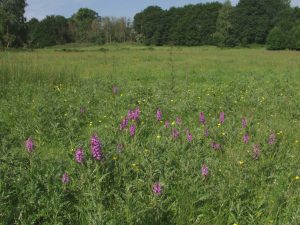With more than 36 years of continuous data collection across many biomes, the Long Term Ecological Research (LTER) Network is a rich source of information for testing big-picture concepts about how ecosystems work. Luckily, the Network also brings together a group of scientists with creative ideas about how to wring new insights from diverse data sources.
The LTER synthesis working group process is designed to capitalize on the experiments, contextual knowledge, data, and creativity of the LTER Network. By funding small groups of scientists from inside and outside the Network to work intensely together on a synthesis project, the process encourages the ecological community to use existing data to probe novel theories, test generality, and search for gaps in our understanding. The LTER Network Communications Office is pleased to announce the selection of two new LTER synthesis working groups that do just that.
Investigators Lauren Hallett, Daniel Reuman, and Katharine Suding will lead a diverse group of terrestrial, aquatic, and quantitative ecologists studying how the timing of population fluctuations affects ecological stability. A group led by Forest Isbell, Jane M. Cowles, and Laura Dee will draw on experiments and observations from LTER and other global networks to understand how the relationship between biodiversity and productivity changes when moving from experimental plots to long-term, large scale ecosystems.
The two funded proposals were chosen from a pool of 20. “The response to the first two NCO calls for synthesis proposals has shown us both the enormous scientific opportunity and enthusiasm for cross-site research,” says Network Communications Office Director Frank Davis. “Both projects combine a strong theoretical foundation, data from many sites and ecosystems, and sophisticated analytical approaches. We are looking forward to supporting them!”
Working groups meet several times for up to a week, over a period of one to two years. The Network Communications Office provides logistical support, advice and assistance in the collaborative process and technical assistance in the open science tools needed to harmonize large and diverse data sets.
The Network Communications Office expects to issue a request for synthesis working group proposals annually, with the next deadline in October, 2017. New submissions and revised proposals will be welcome at that time.
2017 LTER Synthesis Working Groups
Synthesizing population and community synchrony to understand drivers of ecological stability across LTER sites
Principal Investigators: Lauren Hallett, Daniel Reuman, Katharine Suding
Understanding factors that influence ecological stability is a key question in ecology. Population ecology has highlighted that synchrony within a species over space is an important indicator of species stability. Community ecology, in contrast, has highlighted that asynchrony between species within space may enhance the stability of aggregate properties (such as total productivity). Using LTER data, we will integrate population and community approaches to synchrony to understand drivers of ecosystem stability at different scales. We will apply cutting-edge statistical techniques (e.g., wavelet analyses, variance decomposition) to long-term, spatially replicated data from terrestrial and aquatic LTER sites in order to: 1) understand the timescales at which synchrony occurs, 2) identify drivers of synchrony and 3) integrate the effects of population and community synchrony on ecological stability. Our diverse group consists of terrestrial and aquatic ecologists with synthesis experience and quantitative ecologists with strong analytical skills. Final products from the working group will include an R package containing our analytical tools, a data workflow and derived data product, and a series of papers synthesizing causes and consequences of synchrony across the LTER network.
Scaling-Up Productivity Responses to Changes in Biodiversity
Principal Investigators: Forest Isbell, Jane M. Cowles, and Laura Dee
Although hundreds of short-term local experiments indicate that random changes in biodiversity can cause substantial changes in primary productivity, considerable debate remains regarding whether these influences of biodiversity are weaker or stronger at larger spatial and temporal scales in natural ecosystems. Given this knowledge gap, current models often implicitly assume no influence of biodiversity on ecosystem productivity, likely leading to inaccurate predictions in at least some cases. We propose to develop and test a strategy for scaling-up results from biodiversity experiments to natural communities by testing theory and bridging gaps between previous experimental and observational studies. In the four proposed meetings, one of which would be co-funded, we will advance understanding of scaling up in space, scaling up in time, and accounting for non-random shifts in dominant traits. Integrating these three advances will allow us to generalize from a few experiments to data from many grasslands and forests worldwide, including those at 17 LTER sites. The proposed activities would enable prediction of the scales and conditions under which changes in biodiversity strongly or weakly influence ecosystem productivity.








